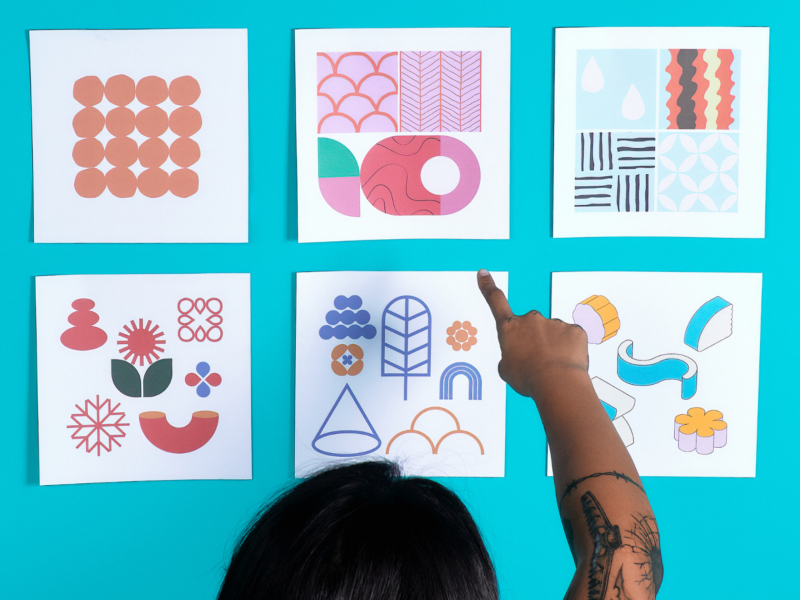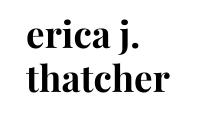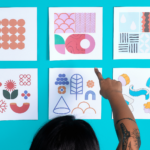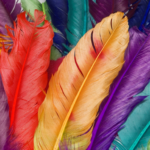
One of my best friends from childhood told me recently that she remembered me always carrying around a book with me at school. I honestly don’t recall that, but I’m not surprised! I do love a good read.
I guess it makes sense that I now work in libraries…and that I like to keep a small shelf in my office stocked with books that inspire me. I even display a book “face out”–as we call it in the book biz–on an acrylic easel. Is this merchandising? Ha! Probably. But a book cover can be a terrific conversation starter.
It also makes sense that I’m always generating ideas from what I read. Ask my coworkers: I love to creatively problem-solve or build out ideas (and fill up notebooks with ideas, sketches, and mind maps, but that’s another essay). Inspiration is everywhere…especially in books.
Books. Brainstorming. Creativity. Does that link surprise you? Read widely to to learn about a variety of topics and ideas, and you’ll learn to make some really cool connections. You’ll learn the language to communicate with different folks at the office. Or do some major ear-hustling at parties and networking events.
And impress your coworkers with some darn fine brainstorming.
Do you keep a shelf near your desk with books you’ve read or want to read? If you do or if you don’t, here are a few ideas for creating or refreshing yours.
But First: Look beyond professional development titles
I’ve read a lot of productivity, leadership, and time management books in my time. And while I usually find interesting and actionable ideas, I’ll admit they all start to sound the same after a while (and they tend to refer to the same studies and thought leaders). That’s why I like to mix things up with new topics and ideas.
Here’s a smattering of subjects that keep me inspired (and prepared!).
Cookbooks
Everyone eats. And “What’s for dinner?” is the broken record playing at my house. That’s why I keep cookbooks in my office for both inspiration and for last-minute meal planning. I love the beautiful photos of food, and the recipes usually have some interesting stories behind them, too.
Art and design
When you know a little about art and design, you get instant creativity cred. I’ve devoured books about graphic design, and I’ve also enjoyed browsing modern art photos just to add some beauty to my day. Lately, I’ve been working on my sketching skills on my lunch break with a beautiful nature sketching how-to book.
Travel writing
Escape the break room and dig into a dispatch from abroad: Arm chair travel is enlightening and inspiring. I recently enjoyed a 1950s classic about an American eating traditionally in Italy’s Tuscany region. A simple travel guide is another good way to imagine yourself somewhere else. You’ll envision the culture in other cities and countries with maps, restaurant ratings, sightseeing recommendations, and more.
Memoirs
Sometimes it’s good to choose a memoir from someone controversial or outside your notions of who a thought leader should be. Musicians, royalty, journalists, chefs, and other personalities might be connected in some way to your life. Or their stories may cement or destroy your position on certain topics. I recently had a good chuckle over comedy musician Reggie Watts’ 2023 memoir Great Falls, MT: Fast Times, Post-Punk Weirdos, and a Tale of Coming Home. So much 80s goodness in there.
Fiction
I love to escape with science fiction and fantasy, or explore different personas in literary fiction. Turns out a lot of people enjoy fantasy writing: I recently went to a party where I knew no one and ended up discussing fantasy/sci-fi writers Stephen King and R.F. Kuang with someone for an hour. Great storytelling translates to movies and TV, so look for connections there, too.
Personal finance & economics
I feel like we all should have a grasp on how money works, so here’s a good subject area to explore. Even if you don’t want to dive into economics theory, you can find some great titles that use infographics and images to tell the story of money. Money touches everything: The more you read on this subject, the more you’ll notice the cross-pollination with money writers and deep thinkers.
Children’s books
Was there a book from your childhood that you loved? Place it lovingly on your office bookshelf and then maybe read it again! Or grab a classic that you never got a chance to read. Reading children’s literature as an adult is a totally different experience. Examine the simple cadences and sentences–They give a good lesson in writing for readers with varying abilities. And picture books past and present can have amazing illustrations.
Graphic novels
Graphic novels are not just comic books, or just for kids: They cultivate visual literacy. Illustrations and a sprinkling of text are capable of telling a really mind-melting story. Since they don’t typically read in a linear way, experiencing this format will train your brain to think a little differently, too.
And Finally, a Pro Tip: Try before you buy
If you’re a ravenous reader who wants be more intentional about your book purchases, I highly recommend visiting the public library on your lunch break (of course I had to plug the library). Even if you don’t have time to browse in-person, most libraries have a website where you can shop for titles online, get notified when they’ve arrived, and pick them up on your break. Everything is free to borrow. And when you try a title before you buy it, you can feel good about buying something you know you’ll refer to again and again.



